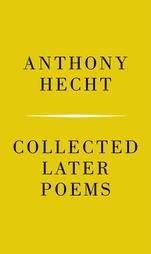Anthony Hecht (1923 - 2004)
Anthony Ivan Hecht, (January 16, 1923 -October 20, 2004), was an American poet. His work combined a deep interest in form with a passionate desire to confront the horrors of 20th century history, with the Second World War, in which he fought, and the Holocaust being recurrent themes in his work.
In 1944, upon completing his final year at Bard, Hecht was drafted into the US 97th Infantry Division and was sent to the battlefields in Europe. He saw a great deal of combat in Germany, France, and Czechoslovakia. However, his most significant experience occurred on April 23, 1945. On this day Hecht's division helped liberate Flossenbürg concentration camp, Hecht was ordered to interview French prisoners in the hope of gathering evidence on the camp's commanders. Years later, Hecht said of this experience, "The place, the suffering, the prisoners' accounts were beyond comprehension. For years after I would wake shrieking."
After the war ended, Hecht took advantage of the G.I. bill to study under the poet-critic John Crowe Ransom at Kenyon College, Ohio. Here he came into contact with fellow poets such as Robert Lowell, Randall Jarrell, Elizabeth Bishop, and Allen Tate. He later received his master's degree from Columbia University.
Anthony Hecht, now in his eightieth year, has earned a place alongside such poets as W. H. Auden, Robert Frost, and Elizabeth Bishop. Here under one cover are his three most recent collections–The Transparent Man, Flight Among the Tombs, and The Darkness and the Light. The perfect companion to his Collected Earlier Poems (continuously in print since 1990), this book brings the eloquent sound of Hecht’s music to bear on a wide variety of human dramas: from a young woman dying of leukemia to the tangled love affairs of A Midsummer Night’s Dream; from Death as the director of Hollywood films to the unexpected image of Marcel Proust as a figure skater.He glides with a gaining confidence, inscribesTentative passages, thinks again, backtracks,Comes to a minute point,Then wheels about in widening sweeps and lobes,Large Palmer cursives and smooth entrelacs,Preoccupied, intentOn a subtle, long-drawn style and pliant scriptIncised with twin steel blades and qualifiedPerfectly to express,With arms flung wide or gloved hands firmly grippedBehind his back, attentively, clear-eyed,A glancing happiness.
